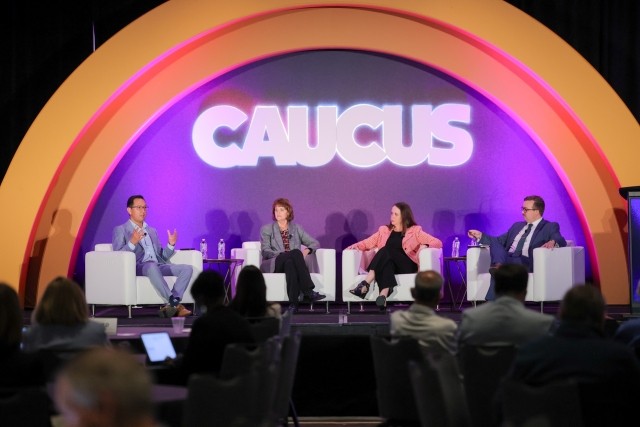Leagues, credit unions share importance of active, constant advocacy
Monday’s sessions at Congressional Caucus examined the ins and out of successfully advocating for credit unions and their members at the local, state, and federal level.
A breakout session on the importance of grassroots advocacy explained why such programs are necessary at credit unions of all sizes to achieve advocacy goals. A general session shared successful tactics during this year’s Don’t Tax My Credit Union campaign.
“You don't start a culture of advocacy when you're getting ready to go to war. You do it well ahead in time in starting to plant those seeds, and it’s very important to start from the top down. Get your board members involved, your team involved, and you explain to them the importance of advocacy,” said Amy Brodersen, president/CEO of Family Focus Federal Credit Union. “The ‘why’ behind it is really important. In today's world, we forget to explain to people why they're doing things, and to get buy-in, you have to be able to tell them why. My team in particular gets it, because we talk about it. It's in our culture, it's in our staff, in our shop all the time.”
As a small credit union with 12 total staff members, Brodersen said tools like America’s Credit Unions Member Activation Program and Project Zip Code are key to maximizing impact for credit unions of any size.
Brent Tercero, executive director of credit union advocacy at SchoolsFirst Federal Credit Union, said his credit union works to have a member of each team on the advocacy committee to make sure information gets to staff in all areas.
“If you're just starting off in the grassroots world, finding small wins to demonstrate to your team the importance and power of grassroots, advocacy, and grassroots organizing - that's what gets people excited,” he said. “In organizing, there's this saying, ‘how do you eat an elephant? One bite at a time.’”
He shared the credit union’s success in setting up an event to shore up support for the credit union tax status with House Financial Services Committee member Rep. Young Kim, R-Calif. More than 100 credit union members attended, and at least two-thirds were constituents from Kim’s district.
April Mobley, Texas Grassroots and PAC Director for the Cornerstone League, encouraged credit unions to work to make sure members know what’s at stake.
“From the Don’t Tax campaign, to the next state legislative session, every voice matters. Whether it’s an action alert response, whether it’s a phone call to that elected official's office, whether it's a comment call for a regulatory issue, every voice matters,” she said.
Cornerstone’s approach included more than 100 meetings with Congress, including multiple fly-ins from each of their five member states to Washington, D.C., during the Don’t Tax My Credit Union campaign.
While recapping the campaign, Utah’s Credit Unions President and Chief Advocacy Officer Rusty Cannon shared how they made an impact. Utah credit union members sent more than 98,000 messages to members of Congress through the campaign, the second-highest amount by state.
“Any time we can get good facts in front of our elected officials is very much appreciated,” he said. “We start from very early on in the relationship with all of our elected officials, getting them the types of stories, the types of numbers, because they make an impact in an important way.”
